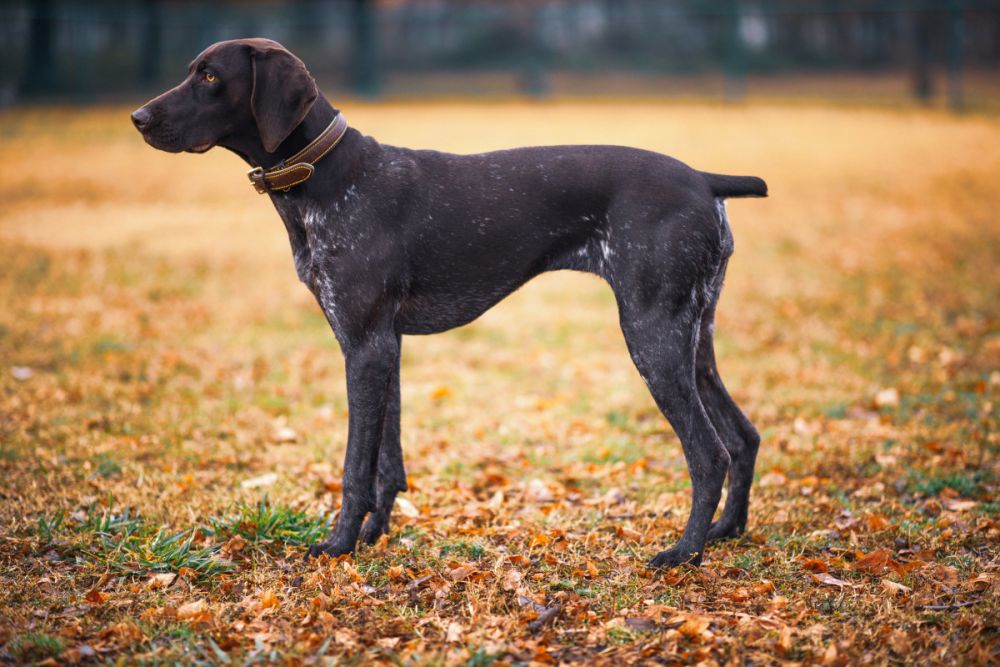
Dog Breed Guide: German Shorthaired Pointer
A sporting dog breed, the German Shorthaired Pointer is a versatile animal that hunts a range of game, retrieves from water or on land, and is a loving, loyal companion. He has a beautiful, low-maintenance coat but needs plenty of energetic exercise. Anyone providing him with the physical and mental stimulation he yearns for will have a faithful, loving friend for life.
History of the German Shorthaired Pointer
Although there are early recorded versions of this breed from around the 17th century, the German Short-haired Pointer that we are familiar with today was only created around the middle to late 19th century.
General Physical Characteristics of the German Shorthaired Pointer
German Shorthaired Pointer males are from 23 to 25 inches in height at the shoulder, and weigh around 55 to 70 pounds. Females of the breed can be anything from 21 to 23 inches tall at the shoulder and can weigh between 45 and 60 pounds.
Their coat is short, thick, and water-resistant. It is slightly longer on the back edges of the rear end (haunches), as well as the underside of the tail. The coat on the head is thinner, shorter, and softer. The colors range from solid liver, as well as a combination of white and liver, and sometimes too small isolated areas of black. The German Short-haired Pointer coat can also be patchy, as well as roaned, meaning a fine blend of colored and white hairs.
They do not shed excessively, and their short coat will stay in good condition if given a good brush every week with a firm-bristle brush and bathed only if and when necessary.
Character and Temperament of the German Shorthaired Pointer
Clever, willing, and friendly, this is an exceptionally trainable breed. He is always enthusiastic but never flighty or nervous. German Shorthaired Pointers do not like being on their own and develop separation anxiety if left alone for long periods of time. He is not a yard and kennel dog but rather a dog that likes to stay inside with his family. Although he will love all members of the family, he might choose one of them as his special human.
They are excellent with small children, provided that they have been raised together. Being an exceptionally energetic dog, the German Short-haired Pointer makes a fantastic playmate for older children in the family. Mature GSPs who are not familiar with small children will probably be better in a family where the children are older and know how to interact with dogs.
They are able to get on with other dogs but could be a bit aggressive toward dogs of the same sex. Being hunting dogs, there is also a chance that they could become aggressive toward other small and furry pets like rabbits or cats. It is possible to socialize them from when they are puppies, but these socialization courtesies might very well not be effective toward strange animals who visit the property.
Life Span of the GSP
German Short-haired Pointers can live for anything between 12 and 15 years.
Common Health and Personality Issues in GSPs
Just like all other dogs, the GSP also needs to be exposed to a variety of people, sights, experiences, and sounds when they’re still puppies. This early socialization helps the dog grow into a well-adjusted adult, able to get along with other animals, small children, family members, and all other people he comes into contact with.
They are, on the whole, healthy dogs, but just like most other breeds, they tend to be prone to certain types of illnesses. This is not to say, though, that all GSPs will get some or all of these diseases, but it’s a good idea for anyone considering the breed to be aware of these diseases.
- Hip Dysplasia – deformity of the hip joint
- Lymphedema – tissues swell due to accumulated fluids caused by twisted lymphatic ducts or valve blockage of lymph flow
- Cancer – a common medical issue in the breed, with the most reported cancers being mammary tumors, lymphosarcoma, and mast cell tumors.
- Von Willebrand’s Disease – a disorder in the blood found in both humans and dogs, that affects the clotting process.
- Entropion – a defect that causes the eyelid to roll inwards, injuring or irritating the eyeball. Surgery can correct the condition.
- Gastric Dilation-Volvulus (GDV), aka Torsion or Bloat – this life-threatening disease can affect large, deep-chested dogs such as GSPS, usually when they are fed one large meal per day, eat too fast, consume too much water after eating, or become too active directly after eating. The condition occurs when the stomach becomes bloated with air or gas and then flips over (torsion). Medical attention is necessary immediately, or the dog will die.
The German Shorthaired Pointer is extremely energetic and should have at least one hour of vigorous exercise every day, preferably off the leash, or he could become destructive and nervous.
